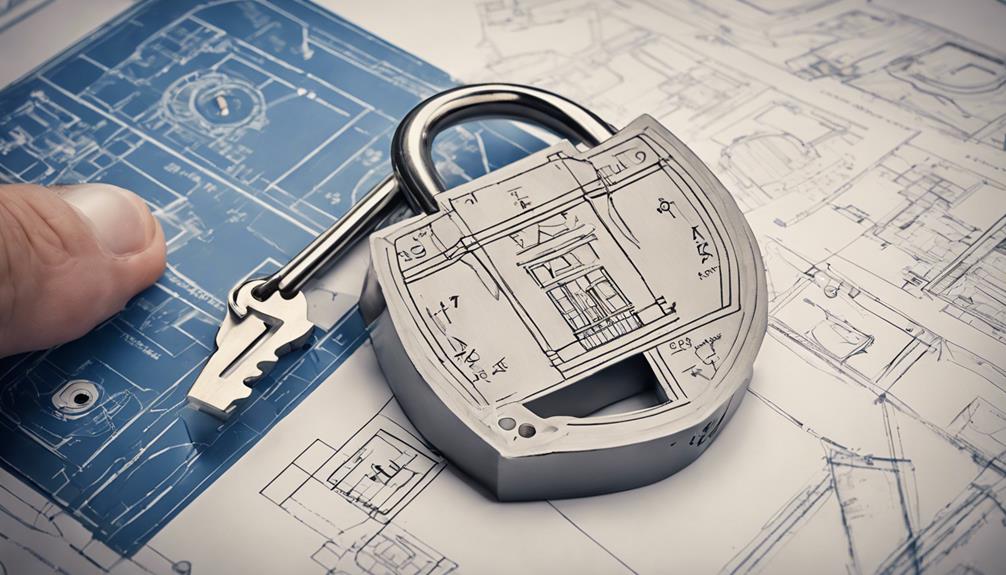When considering lock replacement, it's crucial to understand local building codes. These codes dictate what types of locks you can use, especially in multi-family and commercial properties. Regular lock replacement not only enhances security but also guarantees compliance with safety regulations. You'll want to choose locks that meet industry standards and consider accessibility features for ease of use. Always check if you need permits for installation, as compliance can help avoid penalties. Knowing these basics will keep you protected, but there's much more to explore about best practices and professional help for lock replacement.
Key Takeaways
- Understanding local building codes is crucial for compliant lock installation and to avoid penalties.
- Regular lock replacement enhances security and meets safety regulations, especially in multi-family or commercial buildings.
- Selecting locks that meet ANSI/BHMA ratings ensures resistance to tampering and forced entry.
- Accessibility features like lever handles and keyless entry promote inclusivity and ease of use for all individuals.
- Consulting qualified professionals for installation guarantees compliance with codes and enhances overall safety.
Understanding Building Codes
Building codes play an essential role in ensuring safety and structural integrity in your home. When it comes to security, understanding building code lock requirements is important. These codes dictate the type of locks and security measures you must have in place, ensuring you protect your loved ones and belongings.
Familiarizing yourself with these regulations helps you create a safer environment, encouraging peace of mind. Additionally, understanding local regulations regarding lock replacement is significant for compliance and safety navigating local regulations.
You also need to reflect on lock replacement legalities. When replacing locks, it's important to comply with lock codes to avoid penalties or safety risks. Many jurisdictions have specific requirements regarding the type and placement of locks, especially in multi-family units or commercial buildings.
Importance of Lock Replacement
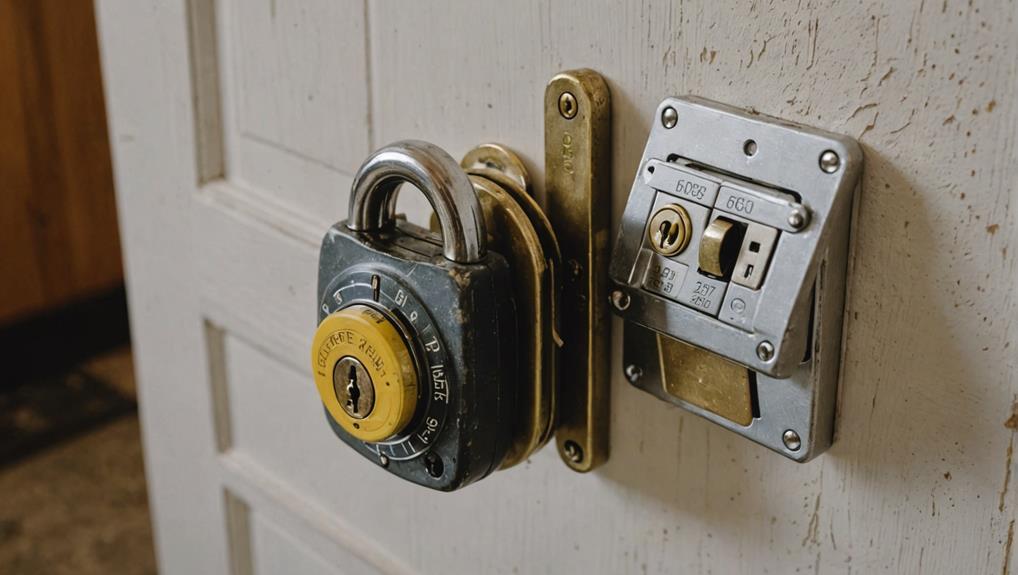
When it comes to securing your home, regular lock replacement is vital for maintaining safety and peace of mind. Over time, locks can wear out or become compromised, leaving your home vulnerable. By prioritizing lock replacement, you're not just protecting your property; you're also guaranteeing the safety of your loved ones and neighbors.
Moreover, businesses should consider vital lock replacement for business security to safeguard their assets and sensitive information. Understanding lock replacement building codes is imperative. These codes provide guidelines that help you choose the right locks that meet safety standards. Compliance with these codes isn't just a legal obligation; it's a commitment to the well-being of your community.
Additionally, lock installation regulations vary by area, so it's important to stay informed. You want to ascertain that the locks you install adhere to local requirements, which can enhance overall security.
Don't forget to follow lock compliance tips. Regularly check your locks for signs of wear and consider replacing them every few years, or sooner if you've experienced a break-in or lost your keys.
Key Factors in Compliance
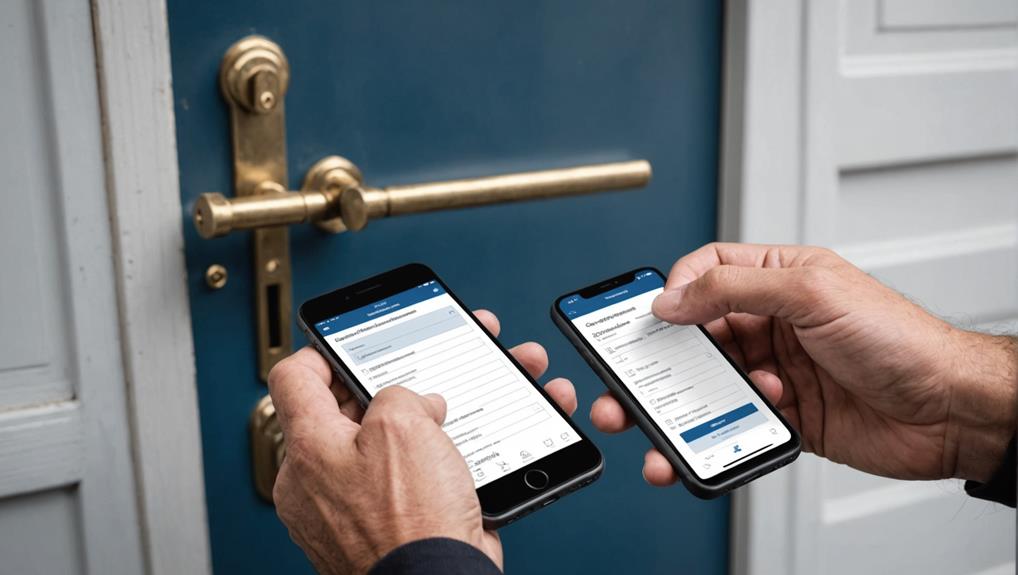
Guaranteeing your locks comply with local regulations is crucial for effective home security. By understanding the key factors in compliance, you not only protect your property but also serve your community by adhering to established standards.
First, familiarize yourself with the specific building codes for locks in your area. These codes often dictate the types of locks that are acceptable, including their strength and functionality. Additionally, consider how fire safety regulations may impact your lock choices, as they can dictate specific requirements for residential and commercial properties, particularly in high-risk areas. For more information on these regulations, refer to navigating fire safety rules.
Next, consider the installation process. Properly installed locks guarantee safety and compliance, so follow the guidelines set forth in the building codes. It's also important to choose locks that meet recognized industry standards, as these are often referenced in local regulations.
Lastly, keep in mind that regular inspections can help you maintain compliance over time. By routinely checking your locks and guaranteeing they meet current building codes for locks, you not only safeguard your home but also contribute to the overall safety of your neighborhood.
Types of Locks and Standards
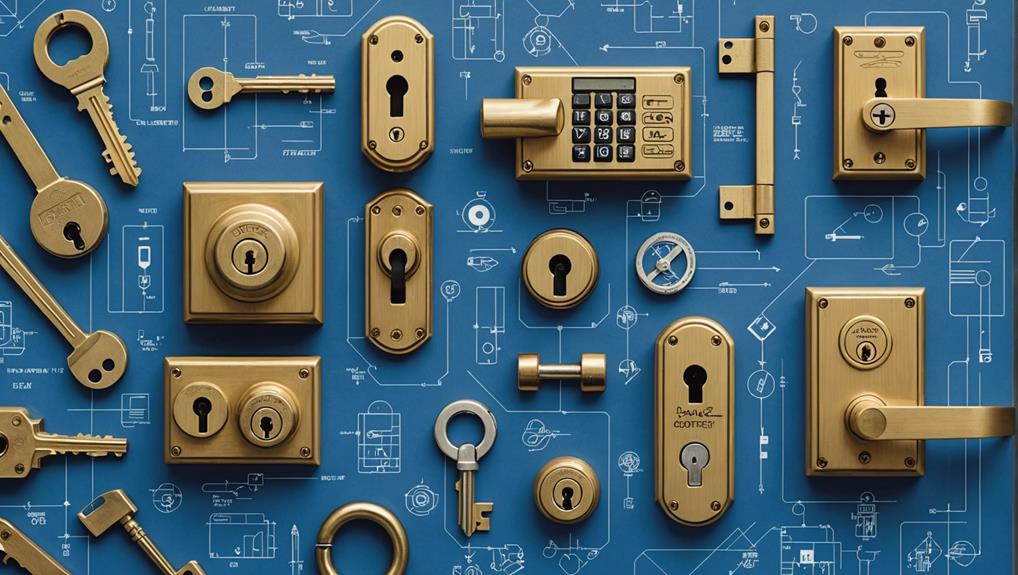
Understanding the various types of locks and their corresponding standards is essential for maintaining security and compliance.
When you choose the right lock, you're not just protecting property; you're safeguarding the people you serve. Selecting a lock that fits both your security needs and lifestyle is vital, as emphasized in choosing the perfect lock.
Here are four key types of locks to take into account:
- Deadbolts: Offering superior strength, deadbolts are great for exterior doors, ensuring your loved ones feel secure at home.
- Smart Locks: With advanced technology, smart locks provide convenience and remote access, allowing you to keep an eye on security from anywhere.
- Knob Locks: Often used for interior doors, knob locks are simple but effective for areas that don't require high security.
- Padlocks: Versatile and portable, padlocks are perfect for lockers or gates, giving you peace of mind wherever you go.
Accessibility Requirements
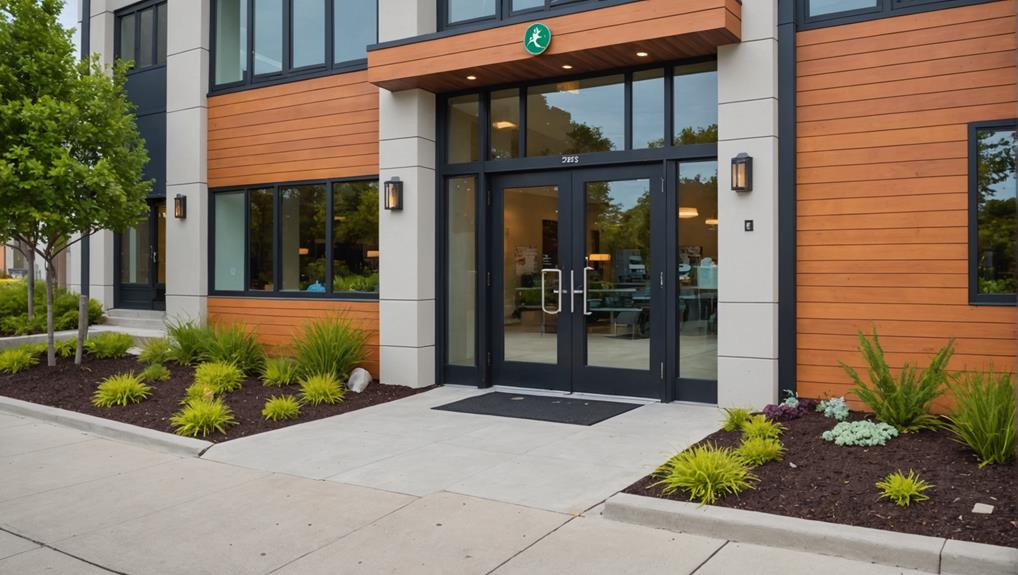
Accessibility requirements play a crucial role in building codes, guaranteeing that everyone, regardless of ability, can navigate spaces safely and comfortably. When you're considering lock replacement, it's important to keep these requirements in mind. Accessible locks not only facilitate ease of use but also promote inclusivity in your community.
Here's a quick reference table to help you understand key accessibility features for locks:
| Feature | Description | Importance |
|---|---|---|
| Lever Handles | Easy to operate with limited strength | Enhances usability for all users |
| Keyless Entry | Eliminates the need for traditional keys | Simplifies access for those with dexterity challenges |
| Visual Indicators | Clear signals for lock status | Assists individuals with visual impairments |
| Low Height Installation | Accessible for all users | Guarantees everyone can reach the locks |
Fire Safety Regulations
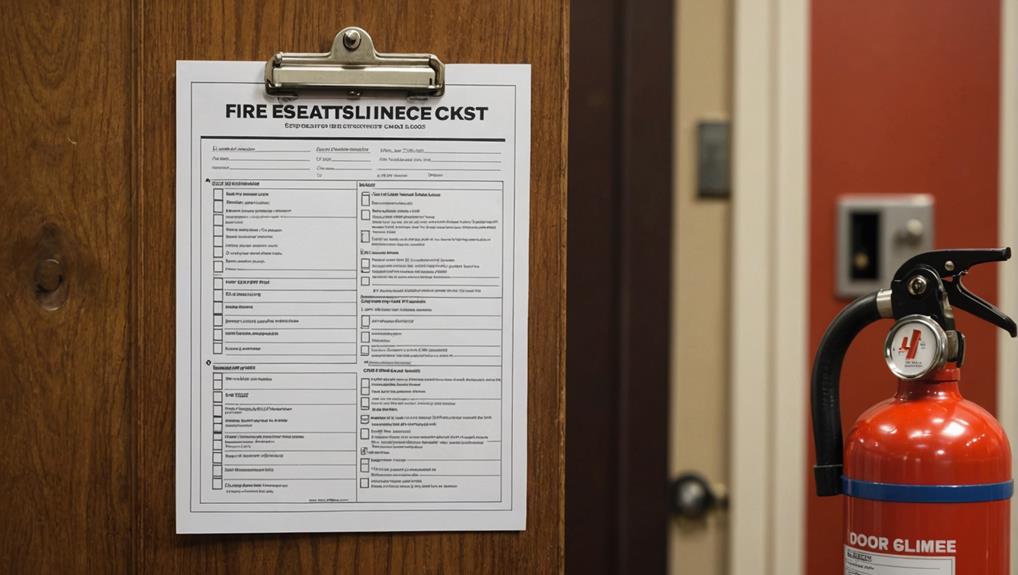
When it comes to fire safety regulations, knowing the importance of fire exits is essential for any building.
You'll find that proper emergency lighting is just as necessary, ensuring everyone can evacuate safely in an emergency.
Let's explore how these elements play an important role in your building's safety plan.
Importance of Fire Exits
Guaranteeing safe and efficient fire exits is essential for protecting lives during emergencies. When a fire breaks out, every second counts, and having clear, accessible exits can make all the difference.
Your commitment to providing safe environments can help prevent panic and chaos, allowing everyone to evacuate swiftly and calmly.
Here are four key reasons why fire exits are so important:
- Immediate Access: Accessible fire exits reduce evacuation time, allowing occupants to escape quickly.
- Clear Pathways: Well-marked and unobstructed exits guide people safely out of the building, even in the dark or smoke.
- Compliance with Regulations: Adhering to fire safety codes guarantees your building meets legal standards, protecting you from liability.
- Peace of Mind: Knowing there are reliable exits creates a sense of security for everyone, allowing them to focus on safety rather than fear.
Emergency Lighting Requirements
Emergency lighting plays an essential role in fire safety regulations, providing guidance and reassurance during an emergency. When you're responsible for a building's safety, it's imperative to ascertain that emergency lighting systems are properly installed and maintained. These lights illuminate exit paths, helping people navigate safely to an exit during a crisis.
You should be aware that most building codes require emergency lighting in specific areas, such as stairwells, hallways, and exits. It's not just about compliance but about creating a safe environment for everyone.
Regular testing and maintenance of these systems are fundamental, guaranteeing they function correctly when needed. Consider implementing a routine inspection schedule to verify that all emergency lights are operational.
Replace any burned-out bulbs immediately to avoid potential hazards. If your building's layout changes, reassess your emergency lighting needs to confirm everyone knows the safest escape routes.
Security Considerations
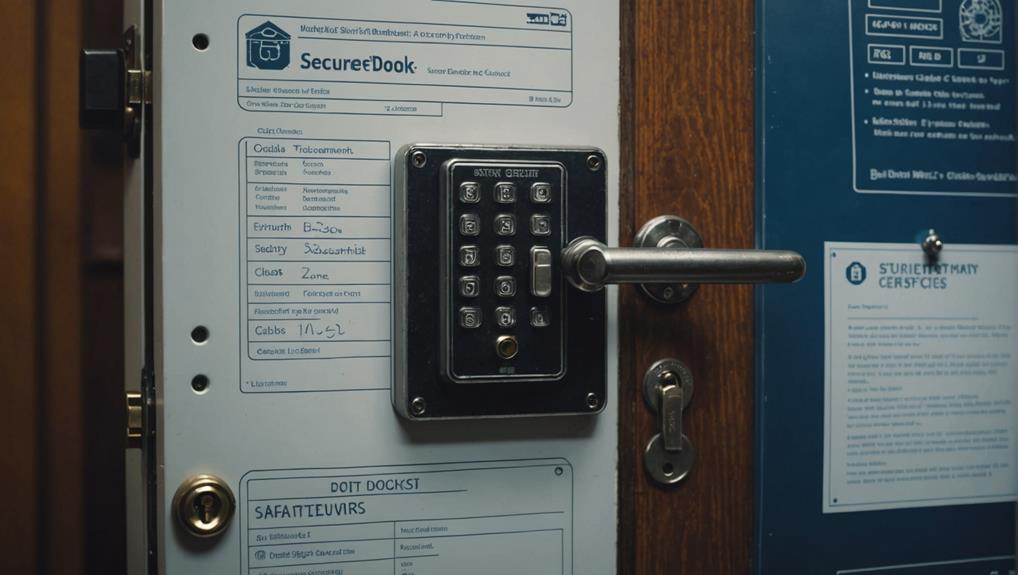
Recognizing the importance of robust security measures, homeowners must consider various factors when replacing locks. While re-keying can be a cost-effective solution for enhancing security, it may not always provide the same level of protection as a complete lock replacement, especially in high-security needs.
Ensuring your home is safe not only protects your belongings but also provides peace of mind for you and your loved ones. Here are four key considerations to keep in mind:
- Lock Type: Choose high-quality deadbolts or smart locks that offer superior protection against unauthorized entry.
- Security Ratings: Look for locks that meet industry standards, such as ANSI/BHMA ratings, ensuring they can withstand tampering and forced entry.
- Installation: Proper installation is essential. A poorly installed lock can be just as vulnerable as a weak one, so consider hiring a professional if you're unsure.
- Key Management: Think about how many keys are out there. Limit access by rekeying or upgrading to a keyless entry system to enhance security, as re-keying vs. lock replacement can meaningfully impact overall safety.
Inspections and Permits
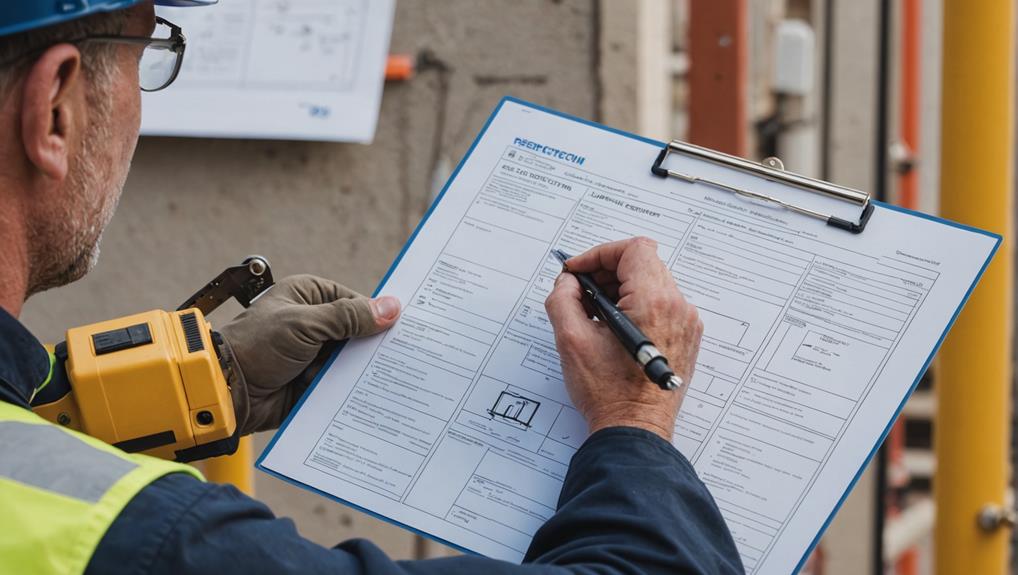
When it comes to replacing locks, many homeowners overlook the necessity of inspections and permits. However, understanding these requirements can help guarantee your project complies with local building codes and enhances safety. Proper lock replacement isn't only about selecting the right type but also about adhering to legal standards that protect your home and family.
Before you begin, check with your local authorities to determine if permits are needed for lock replacement in your area, as lock replacement options can vary greatly by region. Inspections may be required, especially if the lock installation affects other structural elements or security systems.
By obtaining the right permits and scheduling inspections, you not only protect your investment but also contribute to the overall safety of your community. Moreover, having the proper documentation can save you from potential fines and complications down the line. Your neighbors and future homeowners will appreciate your commitment to maintaining a secure environment.
If you're unsure about the process, don't hesitate to reach out to local building departments or community organizations. They often have resources available to guide you through the necessary steps.
Choosing a Qualified Professional
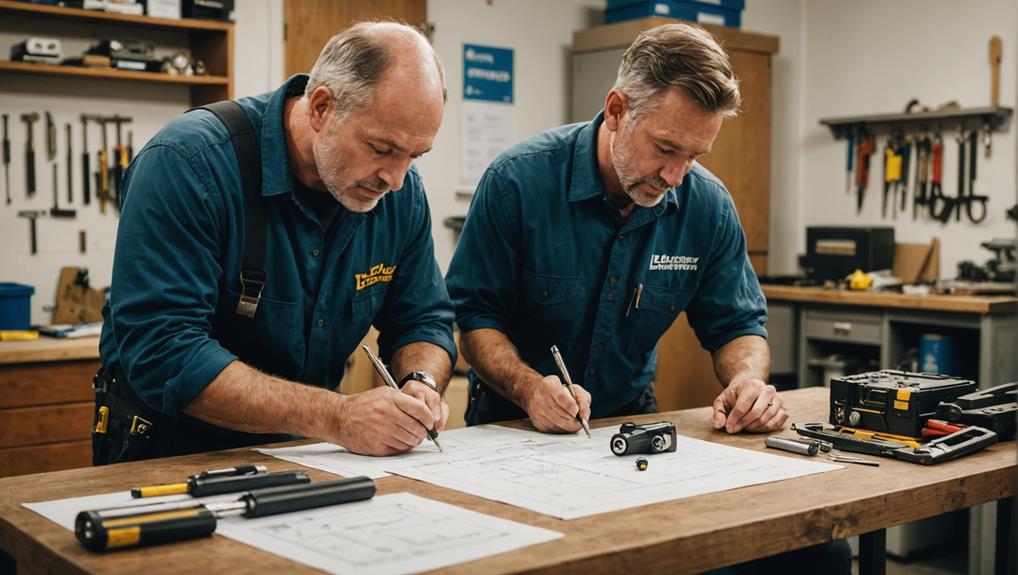
Selecting a qualified professional for lock replacement is vital for guaranteeing the job is done correctly and safely. You want someone who not only understands the technical aspects but also values your safety and peace of mind.
In certain situations, such as when dealing with complex locking systems or if you're uncertain about your own capabilities, when to call a professional locksmith becomes essential.
Here's what to look for:
- Experience: Choose a technician with a proven track record in lock replacement. Their knowledge will assure your locks function flawlessly.
- Licensing and Insurance: Verify they're licensed and insured. This protects you from liability and guarantees they adhere to local codes.
- Customer Reviews: Look for testimonials that reflect their commitment to service. Positive feedback from previous clients shows their dedication to quality and reliability.
- Transparent Pricing: A trustworthy professional provides clear estimates. This transparency helps you feel confident in the investment you're making in your home's security.
Frequently Asked Questions
How Often Should I Replace Locks in My Home?
You should consider replacing your locks every 3 to 5 years, or sooner if you've experienced a security breach or lost your keys.
It's important to regularly assess the condition of your locks, as wear and tear can compromise your home's security.
If you've recently moved into a new place, changing the locks immediately can guarantee your safety.
Keeping your home secure is essential, so don't hesitate to upgrade when necessary.
Are There Specific Locks for Historic Buildings?
They say, "Preservation is the key to our past."
When it comes to historic buildings, you'll find specific locks designed to maintain their integrity and charm. These locks often reflect the period's design while ensuring security.
You should consider options that match the architecture, like antique-style deadbolts or mortise locks.
Can I Install Locks Myself and Still Comply?
Yes, you can install locks yourself and still comply with regulations, but it's important to check local guidelines first.
You'll want to verify the locks meet safety and security standards. If you're unsure, consulting a professional can help. They can guide you through the process, making certain everything's up to code.
What Penalties Exist for Not Following Building Codes?
Failing to follow building codes can lead to serious consequences. You might face fines, forced repairs, or even legal liabilities.
If an inspection uncovers violations, your project could be delayed or shut down, costing you time and trust. Ignoring regulations not only jeopardizes safety but also undermines your commitment to serving others effectively.
How Do I Report Violations of Building Codes?
To report violations of building codes, you'll need to gather evidence, like photos or notes, showing the issues.
Then, contact your local building department or municipality, and provide them with the details. They'll typically have a process in place for complaints.
It's important to follow up if you don't see action taken.
Conclusion
In the world of building codes and lock replacement, staying informed is your best ally—like a trusty sidekick in a superhero saga. By understanding the regulations and choosing the right locks, you're not just securing your space; you're creating a safe haven. Remember, compliance isn't just a box to check; it's a commitment to safety and peace of mind. So, gear up, choose wisely, and let your property shine like the fortress it's meant to be!

